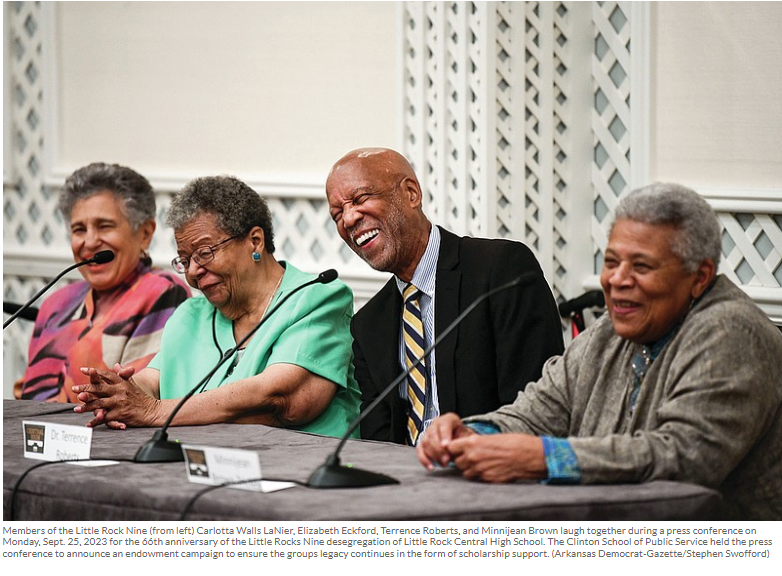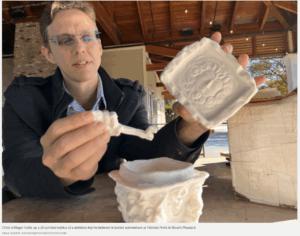ARKANSAS: Little Rock Nine Express Concern O ver History Education in Arkansas, Nationwide
Members of the Little Rock Nine speaking to high school seniors on the 66th anniversary of the Little Rock Central High desegregation crisis criticized legislation passed in Arkansas and across the nation that restricts what can be taught in public school classrooms.
The group also talked about their experience desegregating Central High School, and encouraged those students on the cusp of graduation to understand their own value and to have the courage to accomplish what they set their minds to.
Members of the Little Rock Nine spoke to reporters during a panel at the Capital Hotel following the event. Clinton School of Public Service Dean Victoria M. DeFrancesco Soto, alongside Carlotta Walls LaNier, who serves as the Little Rock Nine Foundation spokesperson, also announced the creation of the Little Rock Nine Scholarship Endowment Campaign.
Five of the members who desegregated Little Rock Central High in 1957 spoke Monday to students at the Robinson Center: LaNier, Minnijean Brown-Trickey, Elizabeth Eckford and Terrence Roberts were present in the auditorium, while Melba Pattillo Beals attended virtually. Little Rock Mayor Frank Scott Jr., Robin White, superintendent of the Little Rock Central High School National Historic Society, and District Superintendent Jermall Wright were among others who spoke at the event.
White, addressing the students, described the event as an “opportunity to interface and engage with living legends, change agents.”
“Each generation calls for agents of change,” she said. “And in their moment of courage and change, 66 years ago, the Little Rock Nine, ages ranged from 14 to 17. So yesterday, today and tomorrow, they are our symbol of hope. They without pause paved the way for us, and we are the benefactors of their sacrifices.”
Wright also highlighted the accomplishments of the Nine, saying it was “hard to imagine that nine brave young people who were just teenagers, just like you, could cause such a seismic shift in education that would impact generations worldwide.”
He said the district’s goals today match those of the Little Rock Nine in 1957.
“Their cause was simple: equitable access to receive a quality education,” he said. “Sixty-six years later, our charge and our cause remains the same.”
Despite highlighting the sacrifices made by the Little Rock Nine and their families, Scott said history education was under attack.
“But yet there’s still Elizabeth Eckford, who stood at 15, but yet some weeks ago she stood at the age of 81 to ensure that the Little Rock School District made certain that their history, American history, was still taught to each of you,” he said. “And that is the type of fight, that is the type of solidarity, that is the type of work ethic that we need to continue to have in the Little Rock School District and the state of Arkansas: not allowing others to revise our history.”
During her introduction, Beals told students there were three things the Little Rock Nine wanted when they integrated the school: voice, choice and inclusion. She urged the audience to remember those three things, and to remember that they are blessed to have had the advantage of a high school education.
“I’ve got faith in you, baby,” she said. “You’re going to make it, OK? You deserve to be whoever you think you are.”
Brown-Trickey lamented that the history of the desegregation crisis isn’t more extensively taught. When she visits other parts of the world, the people there know more about the story than most young people in the U.S., she said.
“It takes a half-page in your history books, if that, but it’s really a complex, amazing story about all components of government, about courts, about persistence of the human spirit,” Brown-Trickey said.
Questions the seniors attending Monday’s event asked the Little Rock Nine included requests for their opinions on recent education legislation, such as the LEARNS Act, media coverage during the desegregation crisis and what encouraged them to continue going to school despite the challenges they faced. The questions were asked by a student representative from each school.
“What are your thoughts on state laws trying to rewrite the history y’all have made?” a student from Southwest Magnet High School asked.
“That’s the question of the day, of course,” Roberts said.
Gov. Sarah Huckabee Sanders has signed two rules so far this year banning “indoctrination” in classrooms. The prohibitions are similar in substance and tone to a federal memo and executive order signed under former President Donald Trump’s administration as far back as 2020, as well as Republican-sponsored legislation in other states.
The state describes these bans as efforts to prevent teachings that are “antithetical to the traditional American values of neutrality, equality, and fairness.”
“As a state, we need to focus on ensuring that students can read on grade level, solve mathematical problems, and are prepared for college, work, and life,” Department of Education spokeswoman Kimberly Mundell wrote in an emailed statement earlier in September. “Indoctrination has no place in schools, and instead of telling students what to think, our priority should always be on teaching them how to think.”
Roberts said that he would have told the governor, if she had attended the event, “It’s imperative that schools provide educational possibilities for students, which includes all of history. And when you take away any part of it, you are in fact neglecting your duty as chief executive.”
“You’re getting in the way instead of promoting educational process,” he said.
LaNier described the efforts to restrict education as “a sad state of affairs, as far as I’m concerned.” Such education is meant to help students learn, understand and assess what has happened, and “how to move forward with better ideas, better ways of doing things,” she said.
In response to a Hall High School student’s question about whether “our education system is headed in the right direction with the LEARNS Act,” Brown-Trickey said she believed the country grapples “with a disease called ‘profound intentional ignorance.'”
“When we talk about things like that, it is an intent to have an ill-informed population so that demagogues can do whatever they want.”
She said the desegregation crisis hurt both Black and white students, and encouraged the audience to imagine what a story like theirs did to the city, and to the country.
Beals compared lawmakers’ bans on critical race theory with the opposition to integrating Central High School.
“You did it once in 1957, and look what you got,” she said. “We are nine monsters just roaming forth. Have you ever in your life seen such big-mouthed people? So do it again and see what you get out of it, OK?”
During an interview with reporters following the event, Brown-Trickey said that people needed to look beyond Arkansas, however. The result of a national effort to restrict curricula is a chilling effect on education, learning and thinking, she said.
Brown-Trickey also warned that young people are “going to get sick of this stuff.”
“They’re going to get sick of being told they don’t deserve to know,” she said. “They’re going to get tired of being told they’re too young to know. They’re going to be tired to have somebody decide whether they should feel guilty or not. And they’re going to rise up, and I’m waiting for that. I’m helping them in every possible way I can.”
ENDOWMENT
The Clinton School of Public Service also launched an endowment campaign on Monday “to ensure the group’s legacy continues in the form of scholarship support,” according to a news release from the school.
“Your gift of $66 will help to ensure that the Little Rock Nine Scholarship carries on in perpetuity, and that the group’s courage continues to serve as inspiration for future generations of public service leaders at the Clinton School,” the release states.
The Little Rock Nine Scholarship was created in 2013 by former Dean James L. “Skip” Rutherford III and the Little Rock Foundation. Since 2015, nearly $30,000 in scholarships have been awarded, according to the release.
Speaking with reporters, Soto, the Clinton School of Public Service dean, said, “We need to ensure that that support continues.”
–arkansasonline.com



